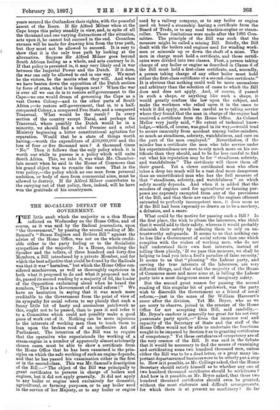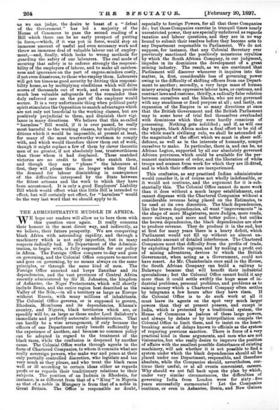THE SO-CALLED DEFEAT OF THE GOVERNMENT. T HE little snub which
the majority in a thin House inflicted on Wednesday on the Home Office, and of course, as it was said by the Radical journalists, upon " the'Government," by passing the second reading of Mr. Samuel's "Steam Engines and Boilers Bill" against the advice of the Home Office, was not on the whole credit- able either to the party feeling or to the Socialistic sympathies of the majority. In a House, including the Speaker and the tellers, of three hundred and forty-five Members, a Bill introduced by a private Member, and for which the best adjective that could be found by the Radicals was that it was "harmless," but which the Home Office con- sidered mischievous, as well as thoroughly capricious in both what it proposed to do and what it proposed not to do, passed its second reading by a majority of 66, the leader of the Opposition exclaiming aloud when he heard the numbers, "This is a Government of social reform !" We have no hesitation in saying that it was much more creditable to the Government from the point of view of its sympathy for social reform to say plainly that such a funny little bit of hasty and anomalous patchwork as this, ought not to be passed, than to pass it and refer it to a Committee which could not possibly make a good piece of work out of it. Nothing can be more injurious to the interests of working men than to teach them to lean upon the broken reed of an ineffective Act of Parliament. The intention of the Bill was to require that the operative who superintends the working of a steam-engine in a number of apparently almost arbitrarily chosen cases, must be able to show a certificate from the Home Office that he has been examined in the prin- ciples on which the safe working of such an engine depends, and that he has passed his examination either in the first or in the second-class. This was Mr. Samuel's description of the Bill :—" The object of the Bill was principally to grant certificates to persons in charge of boilers and engines, but it did not apply generally. It did not apply to any boiler or engine used exclusively for domestic, agricultural, or farming purposes, or to any boiler used in the service of her Majesty, or to any boiler or engine used by a railway company, or to any boiler or engine used on board a steamship having a certificate from the Board of Trade, or to any road traction-engine or steam- roller. Those limitations were made after the 1895 Com- mittee. The principle of the Bill was such that the measure might be called a mining Bill. Briefly, the Bill dealt with the boilers and engines used for winding work- men or minerals up or down the shaft of a mine. The men in charge must hold a certificate, and these certifi- cates were divided into two classes. First, a person taking charge of any boiler or engine as described in Clause 6 of the Bill must hold a first-class certificate, and, secondly, a person taking charge of any other boiler must hold either the first-class certificate or a second-class certificate." It is obvious that nothing could well be more anomalous and arbitrary than the selection of cases to which the Bill does and does not apply. And, of course, if passed in such a shape, or anything like such a shape, it would greatly confuse the law upon the subject, and make the workmen who relied upon it in the cases to which it did apply, much less careful as to taking service where they found that the man in charge of the engine had received a certificate from the Home Office. As Colonel Mellor very justly said, "No extent of technical know- ledge,—which, of course, was good in its way,—would tend to secure immunity from accident among boiler-minders, so much as steadiness, sobriety, watchfulness, and care on the part of the men employed." Nevertheless, if the minder has a certificate the men who take service under his superintendence are sure to rely much more on his cer- tificate than they should, and to be far less careful to find out what his reputation may be for "steadiness, sobriety, and watchfulness." The certificate will throw them off their guard. Yet a clever certificated man who often takes a drop too much will be a vast deal more dangerous than an uncertificated man who has the full measure of that "steadiness, sobriety, and watchfulness" on which safety mostly depends. And when it is added that the minders of engines used for agricultural or farming pur- poses are expressly exempted from any of the provisions of the Bill, and that these are exactly the engines oftenest entrusted to perfectly incompetent men, it does seem as if the Bill had been expressly so drawn as to be a mockery, a delusion, and a snare.
What could be the motive for passing such a Bill ? In the first place, the wish to please the labourers, who think that it would add to their safety, whereas it would probably diminish their safety by inducing them to rely on un- trustworthy safeguards. It seems to us that nothing can be less like a Government of social reform than one which complies with the wishes of working men, who do not half understand their own best interests, instead of telling them plainly, If we pass this measure, we shall be helping to lead you into a fool's paradise of false security.' It seems to us that " pleasing " the Labour party, and serving the true interests of the labourers, are very different things, and that what the majority of the House of Commons more and more aims at, is lulling the Labour party into a most dangerous sense of imaginary safety.
But the second great reason for passing the second reading of this singular bit of patchwork, was the party wish to discredit the Government as a friend of social reform,—just in the sense of Sir William Harcourt's sneer after the division. Yet Mr. Bryce, who as we are sorry to observe, joined in the censure of the Home Office for not accepting this Bill, said candidly,— Mr. Bryce's candour is generally too great for his not very passionate party spirit,—" Even the immense zeal and capacity of the Secretary of State and the staff of the Home Office would not be able to undertake the functions sought to be imposed by Section 8 as to granting certificates of competency." Yet these certificates of competency are of the very essence of the Bill. It was said in the debate that it would be necessary to find the means of examining and certificating some two hundred thousand men, unless either the Bill was to be a dead letter, or a great many im- portant departments of business were to be utterly put a stop to. How is it possible, as Mr. Collings asked, that the Home Secretary should satisfy himself as to whether any one of two hundred thousand certificates should be withdrawn ? And how is it possible, as Mr. Bryce asked, that these two hundred thousand certificates should even be granted, without the most elaborate and difficult arrangements, for which there is at present no machinery ? So far as we can judge, the desire to boast of a "defeat of the Government" has led a majority of the House of Commons to pass the second reading of a Bill which there can be no early prospect of putting in force,—which, if it was put in force, would stop an immense amount of useful and even necessary work and throw an immense deal of valuable labour out of employ- ment,—and, finally, which looks to wrong methods for guarding the safety of our labourers. The real mode of securing that safety is to enforce strongly the responsi- bility of the employers of labour, and to make all careless- ness and ignorance on the part of engine-minders costly, • if not even disastrous, to those who employ them. Labourers -will get ten times as good security by driving this responsi- bility home, as by multiplying conditions which will drive scores of thousands out of work, and even then provide much less valuable safeguards for the remainder than duly enforced care on the part of the employer would secure. It is a very unfortunate thing when political party spirit stimulates the Opposition to snatch advantages which are not only not beneficial to the working classes, but are positively prejudicial to them, and diminish their vigi- lance in many directions. We believe that this so-called 4‘ harmless" Bill would, if it is ever passed, be really most harmful to the working classes, by multiplying con- ditions which it would be impossible, at present at least, for many of the most trustworthy workmen to comply -with, and which would therefore throw them out of work, though it might replace a few of them by clever theoretic men of no greater, if not absolutely less, trustworthiness than those whom it had displaced. These snatched victories are no credit to those who snatch them, and though they may " please " the labourers at -first, they will please them no longer when they find the demand for labour diminishing in consequence of the difficulties interposed by the State between the fittest artisans and the work to which they have been accustomed. It is only a good Employers' Liability Bill which would effect what this little Bill is intended to effect, but will certainly not effect, for "harmless" would -be the very last word that we should apply to it.



































 Previous page
Previous page